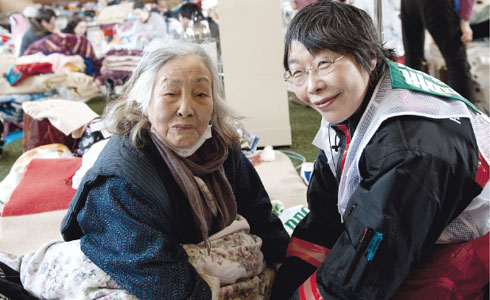A total of more than 53 billion yen was donated to the International Red Cross and Red Crescent Movement, the preferred partner for Allianz in disaster response, directly and immediately benefiting the most affected people via the Japanese Red Cross. Allianz employees and companies contributed more than 590,000 euros to this groundswell of support.
Aid for Japan
Download
So how were the donations used and what is the situation like one year after the catastrophe? Martin Hahn, Head of the International Cooperation Department at the German Red Cross, and Claudia Donzelmann, Head of Corporate Citizenship at Allianz SE, provide some answers.
Thanks to the donations from within Japan and across the globe, the Japanese Red Cross was able to provide extensive assistance. What specific measures were taken?
Martin Hahn: Medical assistance was - and is - an important service the Japanese Red Cross provides: with more than 450 institutions destroyed or damaged, the Red Cross set up temporary and mobile outpatient care facilities and sent radiation experts to Fukushima. About 900 medical teams were deployed to support the initial relief operations. Moreover, to this day specially trained employees have been helping affected people, including members of the relief services, to come to terms with what they experienced.
Many people lost everything they owned. To alleviate their suffering the Red Cross provided them with relief supplies, distributing 132,510 blankets, 183,000 pieces of clothing, as well as 30,132 emergency packages containing everyday items such as towels or toothbrushes.
Moreover, volunteers provided meals for people housed in evacuation centers. To improve living conditions for survivors, electrical appliances like washing machines, rice cookers and hair dryers were also provided to the 144 evacuation centers, and water supplies were extended.

Allianz has business operations in Japan, meaning that it was directly affected by the catastrophe. Why are the company and its employees committed not only to processing the associated claims but also to providing humanitarian aid?
Claudia Donzelmann: As a global company with a business presence in around 70 countries, Allianz takes its responsibility to society very seriously - also beyond its core business. By offering skills, time, money and other resources, we strive to advance social well-being and give financial and practical support to the communities in which we operate. Disaster relief is part of our social commitment.
Whenever severe natural catastrophes occur, as it was the case in Japan, our employees worldwide express their sympathy and solidarity with the people who were affected. They want to provide financial assistance in a direct, unbureaucratic but secure manner - preferably with the support of their company. We respond to this wish by launching local or global fundraising campaigns in which our employees can take part. In Japan's case, Allianz matched all employee donations, turning one euro into two - to the benefit of the victims of the devastating catastrophe.

Japan is a wealthy country - how does disaster relief actually work in countries like these?
Martin Hahn: In a highly developed country disaster relief means allowing the national association to be in the driving seat at all times. The German Red Cross, for example, only provides practical assistance for projects undertaken by the Japanese Red Cross; it does not embark on any projects of its own. In Japan, the infrastructure – such as hospitals and roads - is sufficiently well-developed and there are enough trained staff who are familiar with the environment, the language and the culture of those in need.
Even the material needed to reconstruct any pieces of infrastructure that were destroyed could be sourced within the country. So there was no need to fly in international aid in a conventional sense. Nevertheless international support is important because it is an important signal of solidarity and helps, relatively quickly, to make life for the people affected a little more bearable again.
What is the situation like in Japan today - one year on? What are the biggest challenges?
Martin Hahn: One year after the disaster struck, evacuation centers are now closed and almost all the prefabricated houses that were planned for the homeless have been built. Reconstruction is picking up speed and the Japanese Red Cross is providing assistance to people affected in many ways, for instance by distributing household goods.
Of course psychosocial care for the evacuees constitutes a real challenge: in their prefab settlements people are now having to live in an entirely new environment without old friends and neighbors. This is why volunteers are organizing community events, so that all those living in these temporary estates can get to know one another, feel less lonely and look to the future together in a more hopeful way.
With its numerous emergency and reconstruction efforts the Red Cross has already achieved a great deal - but it will still take years before the consequences of the disaster can be truly overcome.
The global partnership between the Allianz Group and the International Red Cross and Red Crescent Movement has been running since the start of 2011. Aside from immediate disaster response, what else does this collaboration mean?
Claudia Donzelmann: That's a very interesting question which we are addressing in detail this year. Humanitarian aid in emergencies is important, but it should not remain the only joint activity within our partnership.
This is why we are currently working with experts from the Red Cross and the Deutsche Gesellschaft für Internationale Zusammenarbeit, a German development organization, to develop ideas on how Allianz can make an active contribution to disaster prevention based on its core competencies as an international insurer and risk manager.
Our ideas are still in their infancy, but we are convinced that we are on the right track when it comes to combating the impact of disasters as early on as possible.
As with all content published on this site, these statements are subject to our Forward Looking Statement disclaimer.
Link to the disclaimer